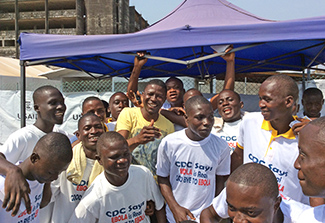Building a bench of researchers in post-Ebola Liberia
July / August 2022 | Volume 21 Number 4
 Photo courtesy of Dr. Soka Moses Dr. Soka Moses poses with volunteers as they prepare to discharge Ebola-negative patients at Ebola treatment unit one at John F. Kennedy Memorial Hospital in Monrovia, Liberia in 2014.
Photo courtesy of Dr. Soka Moses Dr. Soka Moses poses with volunteers as they prepare to discharge Ebola-negative patients at Ebola treatment unit one at John F. Kennedy Memorial Hospital in Monrovia, Liberia in 2014.
When the Ebola epidemic first hit Liberia in late 2013, there were fewer than 200 medical doctors, let alone researchers, in the country to manage or survey the outbreak, according to the WHO. At that time, Dr. Soka Moses had just completed his medical degree at the University of Liberia and was volunteering at the John F. Kennedy Hospital in Monrovia. “There was so much panic," said Moses. “Health facilities were closed, and many doctors were getting infected." That initial outbreak lasted until 2015 and led to more than 5,000 deaths in the country.
Since then, Liberia has been focused on rebuilding its medical and research infrastructure with support and funding from the NIH, CDC, USAID, and other institutions. Two critical building blocks in that research infrastructure are the Training in Clinical and Epidemiological Research (TRACER) program, in which Dr. Moses is currently a research scholar, and the Boston University and University of Liberia Partnership to Enhance Emerging Epidemic Virus Research (BULEEVR) TRACER is a collaboration between the University of California San Francisco (UCSF), the National Public Health Institute of Liberia, the University of Liberia, and the Partnership for Research on Vaccines and Infectious Diseases in Liberia (PREVAIL), a U.S.-Liberia project managed by the National Institute of Allergy and Infectious Disease (NIAID).
TRACER provides emerging researchers in Liberia with lecture-based, mentored, and experiential training in clinical and epidemiological research targeting Ebola, Lassa fever, malaria, and other infectious diseases. Trainees work on research projects happening in-country while working on their master’s in clinical research at UCSF, taking the knowledge learned in the classroom to inform their protocols. Additionally, trainees serve as teaching assistants for at least one course during their time at UCSF to enhance their teaching skills and prepare them for subsequent teaching in Liberia.
BULLEVR is fostering a culture of science in Liberia by increasing human capacity in Liberia to support new and existing research initiatives focused on emerging pathogens. Through training boot camps and mentorship for health care professionals, technicians, educators, and future researchers, leaders of the BULLEVR partnership are identifying candidates for doctoral-level training in translational, public health, and basic sciences.
TRACER currently has three trainees, Dr. Cozie Gwaikolo, Dr. Soka Moses, and Mr. Moses Badio, all of whom are participating in PREVAIL projects during their training. Dr. Gwaikolo and Mr. Badio are both engaged in a PREVAIL project studying short- and long-term symptoms associated with COVID-19. Dr. Moses has been involved in several Ebola-related research projects, including a study funded by the National Institute on Minority Health and Health Disparities (NIMHD), which found that age was one of several risk factors contributing to Ebola persistence in semen. He is currently engaged in an observational PREVAIL study that aims to understand the impact of HIV infection on people in Liberia.
He and his colleagues exemplify what the future could hold for TRACER and similar programs in Liberia. “I am learning skills that strengthen my research abilities with this program for the first time," said Moses. “It has given me the skills I need to conduct rigorous high-quality research that holds up to the international standard."
Training programs like TRACER though small, are essential to ensure there are trained researchers and medical research infrastructure in those countries hardest hit by the ever-growing risk of viral diseases and to prevent future endemics and pandemics.
Dr. Jeffrey Martin is a principal investigator on the TRACER program and Chief of the Division of Clinical Epidemiology and Health Services Research at UCSF, co-directing TRACER alongside his UCSF colleague Dr. Krysia Lindan, a professor of epidemiology and biostatistics. Dr. Martin says, “If our ultimate goal is to promote equity in education and develop a workforce of independent investigators and researchers who can study the issues in countries like Liberia, we need to ensure that local emerging scientists have access to the same level of training that we have in the U.S. It is our responsibility as scientists in the U.S. to give back to our profession and train others who do not have the same infrastructure and opportunity."
More Information
- Scientific publications:
- Related Fogarty grants:
- BU-UL in Liberia Partnership to Enhance Emerging Epidemic Virus Research (BULEEVR)
Updated August 12, 2022
To view Adobe PDF files,
download current, free accessible plug-ins from Adobe's website.
Related Fogarty Programs
Related World Regions / Countries
Related Global Health Research Topics